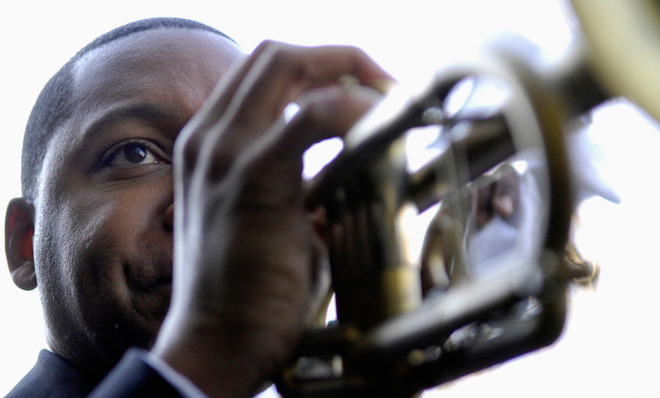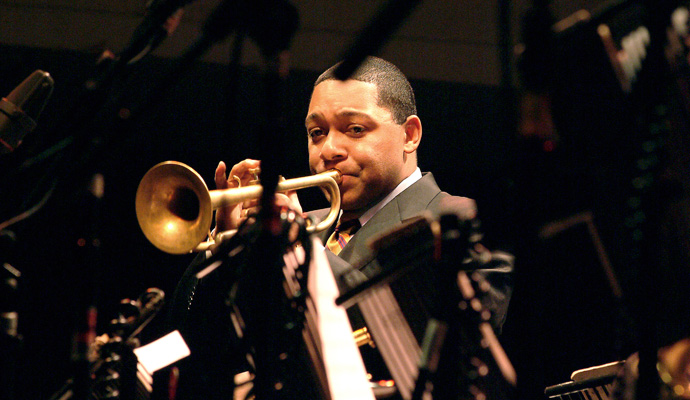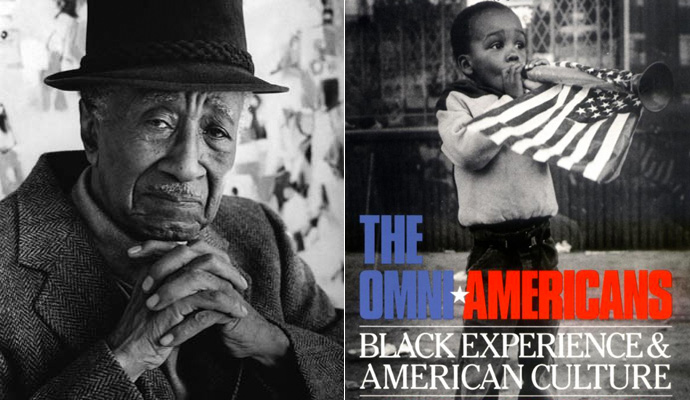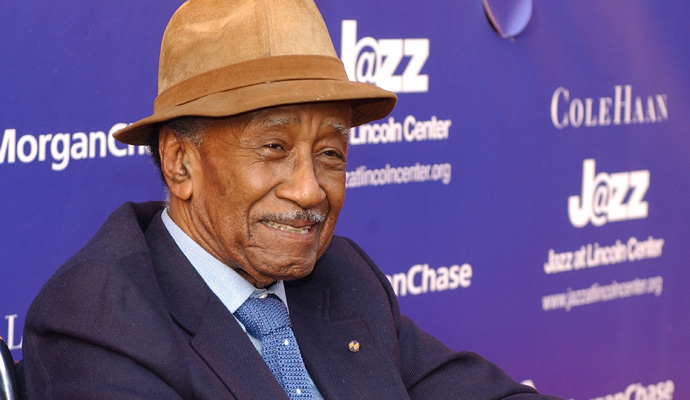Driving Mr. Murray
"Come here to interview me," the old man said, "and you wind up getting an education"

A free daily email with the biggest news stories of the day – and the best features from TheWeek.com
You are now subscribed
Your newsletter sign-up was successful

In the spring of 1993, I wrote an article for Life magazine on the trumpeter Wynton Marsalis. During our several interviews, Marsalis continually referred to a name that clearly meant a lot to him.
He had met Albert Murray in 1982, when Murray was 66 and Marsalis 20, a precocious virtuoso in both jazz and classical music and a Juilliard dropout. He had left school in 1980, his second year, to go on the road with the Jazz Messengers, led by the great drummer Art Blakey.
Within a few months of reading and talking, Wynton knew that Murray was the most important teacher he would ever have. When they had met, Marsalis was only minimally aware of Murray as one of America's seminal writers and thinkers on jazz. Murray gave his new protégé a copy of Stomping the Blues, his 1976 meditation on jazz, and the book upended Marsalis' approach to the music, challenging him to go beyond playing unreflectively, "just playing," as Marsalis said, into an awareness of his playing as part of a tradition.
The Week
Escape your echo chamber. Get the facts behind the news, plus analysis from multiple perspectives.

Sign up for The Week's Free Newsletters
From our morning news briefing to a weekly Good News Newsletter, get the best of The Week delivered directly to your inbox.
From our morning news briefing to a weekly Good News Newsletter, get the best of The Week delivered directly to your inbox.
Wynton began visiting Murray at the latter's apartment, at 132nd Street and Lenox Avenue. At first their talk stuck to jazz, but Wynton soon learned that Murray's interests extended far beyond music. Before long, Murray steered the naïve but intellectually eager young musician into literature, the visual arts, history, mythology and elsewhere. The seminars lasted for years, well past Marsalis's rise to superstardom.
Murray and his wife, Mozelle, helped Marsalis in other ways, too. New Orleanians have it hard — they can move away for 50 years and still "miss home." With his meager three years away from New Orleans, Wynton, still barely out of his teens, was often disconsolate. Gracious Alabamans, the Murrays saw to it that their young friend felt as down-home up north as a Crescent Cityite can.
"I'd go up there almost every Monday," says Marsalis. "You know how Alabama people are just like New Orleans people. Mozelle and I would sit and laugh, and she cooked me fried chicken and black-eyed peas. It was like being back at home with my grandma. It was like I was part of the family.
"Murray loaned me a lot of books. I bought a lot, too. I read Thomas Mann's Doctor Faustus and Joseph and his Brothers, Faulkner, and Hemingway. Constance Rourke's American Humor," which has the status of a bible with Murray. "That was one of the first things he made me read. John Kouwenhoven's Beer Can by the Highway and Made in America — even though Kouwenhoven didn't like jazz! One summer we went through Faulkner's Light in August and Hemingway's The Sun Also Rises. He had me read Heinrich Zimmer, Joseph Campbell — who'd been a friend of his — and other books on mythology. 'Let's work on the elements of Western thought,'" he would say. "So we did Greek and Roman logic and Christian philosophy. We'd go back to music. What styles, not just jazz, did people play in the '30s? All kind of stuff about music. We would argue, too!"
A free daily email with the biggest news stories of the day – and the best features from TheWeek.com
Reading at home late at night, Wynton might be brought up short by a complex problem and phone Murray, a well-known night owl. "Come on up!" he would tell his protégé, "it's all right about the time." When Marsalis reached Murray's, wearing sweatpants and what was not yet called a hoodie, he often found four or five books laid out.
In the early 1980s, a group of arts patrons and power brokers began to discuss expanding the city's arts complex, Lincoln Center, to include a jazz program with its own building, concerts, staff, and resident ensembles. In 1987, Marsalis, only 25, was appointed artistic director of what was christened Jazz at Lincoln Center.
Not long before JALC was to open, Wynton began to have second thoughts about taking the artistic director's job. "I had my band, we were working, I was making good money. Why should I leave my thing to go and work for some place that didn't even exist? For no money!"

In an unexpected role — Zen master — Murray asked his protégé: "Do you understand the difference between going to someone's house when you're sick and going to the hospital? That is why you should do this."
I have never been able to follow that particular koan to enlightenment. Evidently, Wynton was. After all, he and Murray functioned at the same level: genius. Wynton took the job. He holds it today, almost 30 years later: He is jazz's universally recognized statesman, if often vilified for what his critics call an overcommitment to tradition. (That's commitment, says Murray, not overcommitment.)
By the time he had taken Wynton's education in hand, Al Murray had turned himself, against the odds, from a retired Air Force major into an increasingly well-known author. A career serviceman, he retired in 1962 and started writing full time, although he had quietly worked on stories and novels since the late 1940s. He and a close friend, meanwhile, engaged in sophisticated literary discussions throughout the 1950s. The friend was a man with some interest in books: Ralph Ellison. The two had known each other slightly in the mid-to-late 1930s as students at the Tuskegee Institute, in Alabama. They didn't, however, start a decades-long friendship until the late 1940s, bumping into one another in Manhattan. In the 1960s, while Murray was excitedly getting his writing career off the ground, Ellison was more than a decade into what he refused to his death to admit was a failed effort to produce a follow-up to his great Invisible Man.
(More from The Big Roundtable: When a fatal car crash shatters too many lives)
Forty-six is a dauntingly advanced age to kick off a literary career — or any career — but with the optimism, self-confidence and mental toughness that had made him a success in every previous phase of his life — student, teacher, soldier — Murray was soon publishing stories and essays in some of New York's most prestigious magazines and literary journals. Ellison, not by nature a generous man, made an exception for his compadre, introducing Murray to editors and seeing to it that he was invited to high-powered parties.
Murray published his first, explosive, book, The Omni-Americans, in 1970. New in Manhattan's literary world or not, he didn't give a damn about pleasing critics. A loosely cobbled-together string of magazine articles and small-journal essays, The Omni-Americans added up to a scalding polemic ridiculing the perspectives on race of the day's intellectuals, both white and black. Murray's targets were guilty, he wrote, of what he called "social-science thinking": abstract, overgeneralized systems for analyzing society, whose high status among academics betrayed their incapacity for grasping life's complexity. The Omni-Americans was hardly in stores when Murray found himself just ahead of a posse of white liberals, black militants, white radicals, black moderates and academics of both races. Infuriated, they took aim at this Johnny-come-lately. "A put-on," fumed the veteran black historian J. Saunders Redding. "Nonsense!"

Shrugging off, and no doubt enjoying, all the noise, Murray bent to a new task, the autobiographical travelogue, South to a Very Old Place, which reviewers were to greet with a level of warmth equaling their hostility towards its predecessor. South is the book with which Murray's reputation began its ascent in earnest. Published in 1971, it was assigned by The New York Times Book Review to Toni Morrison, then at the start of her own literary career. Murray's book, Morrison wrote, was "nothing less than obligatory reading."
Murray plans South To A Very Old Place — his "meandertale," as he calls it, borrowing the word from Finnegans Wake — as a winding travelogue that will take him down the eastern seaboard, then inland to Atlanta ("Alana" to black Southerners), New Orleans, and Mississippi. Along the way, Murray will take time to colloquize with a string of white writers and intellectuals of progressive reputation. A second lap has a different agenda. Murray wants to explore the Alabama roots of his raising: Tuskegee, his alma mater; and Magazine Point, the tiny community where he grew up, just outside of Mobile.
Murray has recently been stunned to come across a passage by the Yale historian C. Vann Woodward, one of the two or three greatest postwar American historians. Born and raised in east Arkansas, Woodward was a longtime renegade, a young radical in the '20s and '30s and a civil rights activist in the 1950s. The passage in question reads:
I am prepared to maintain that so far as culture is concerned, all Americans are part Negro. Some are more so than others, of course, but the essential qualification is not color or race. When I say All-Americans, unlike Crevecoeur, I include Afro-Americans. They are part Negro, but only part.
Murray's sentiments to a T, as expressed in, for one, The Omni Americans: "American culture, even in its most rigidly segregated precincts, is patently and irrevocably composite. It is…incontestably mulatto." To his delight, Murray has stumbled across a white intellectual brother whose words fly up from the South into Murray's outstretched hand.
So off Murray goes, not southwards but 80 miles northeast, to Yale, a "veritable citadel of Yankeedom," where the Southerner C. Vann Woodward nonetheless roosts, as does his fellow Southern don, Robert Penn Warren, the double-Pulitzer winner, novelist/poet/social commentator.
As Murray's prior exposure to Woodward's ideas has led him to expect, the Arkansawyer delivers the goods. If "pretty good" is Murray's term of highest approval for Southern whites, Woodward is "better than 'pretty good! One of the very best around and getting better all the time! But don't take my word. Check him out for yourself!"
As impressed as he is by Woodward, Murray cannot shake the "kinship aginship problem," as he calls it, the ambivalence he feels even for Southern whites he likes. He can barely help but imagine both Woodward and Penn Warren as "dried-up-assed rosum-chewing squint-eyed crackers." In Murray's mind's eye, Woodward becomes a cracker switch-engine driver like the ones he knew as a boy, a skinny-necked peckerwood hollering at a flock of black youngsters to get off the back of his train: Say now by Gyard, get the hell and skedaddle offen that durn tyar dang bust you little possums. Dang bust you little possums. Dang bust you little possums.
Redheaded Penn Warren, meanwhile, puts Murray in mind of Filling Station Red out of Mobile. But Murray knows he can't omit the "kinship" part — he has read Warren's 1965 study, Who Speaks for the Negro?, and is close to admiring its pretty-goodness.
Almost before he knows it, Murray is below the line, surprised to find himself uneasy, belatedly recalling that the fondly remembered homeland is also the land where lynching is barely a thing of the past. For protection, Murray summons an old ally — Uncle Remus, the resourceful trickster, a "spinner of such yarns and the weaver of such nets as become meshes to catch the wind." As Murray's Alabama boyhood taught him, one of Remus's many skills is outsmarting whites.
Several encounters follow, but none that pique Murray's interest until the distinguished novelist Walker Percy picks Murray up at his well-appointed New Orleans hotel. Murray's "personal radar…which you rate second to none, registers Normal then Cordial then Welcome." It's settled, then: Murray tosses him into the "pretty good" bag, too. (For anyone who's read The Moviegoer, Love in the Ruins, or Percy's correspondence with Shelby Foote, Percy deserves better.)
Black colleges clearly educated, stimulated and prepared generations of blacks for the lives they chose…to lead. Never mind the 'better' white schools, there is a pride-pure belonging, a supportive identity that black colleges seem to foster. [Toni Morrison, The New York Times Book Review, on South to a Very Old Place, January 2, 1972]
Ralph Ellison loathed Tuskegee and bolted after his junior year. His fictionalized portrait of the school in Invisible Man boils over with fury. Murray was a different case: He flourished here. If he started out engaged in his share of freshman shenanigans, it didn't take him long to get serious, which in his case meant entering the world of the word. Murray's passionate, lifelong engagement with Western literature began with the encouragement of the improbably named Morteza Drexel Sprague, the English Department chairman, though he was not much older than his students.

Sadly, Morteza Drexel Sprague died young. Murray's delayed eulogy in South to a Very Old Place is as heartfelt a statement as he ever made. Sprague, he writes,
is gone — too soon departed — forever. But the crucial if not definitive good fortune that is yours for having been a pupil in whom he took special interest is everlasting. Because such is the comprehensive generosity that all truly great teachers radiate as much outside as inside the classroom is that you will always rejoice at the mere fact that he was there when he was.
Whenever Sprague introduced young Al to a master — Hemingway, Eliot, Kafka, and "and, best of all, Thomas Mann's Joseph story," he discussed the text carefully with his student. Clearly, it was Sprague — with his eagerness for his students, at least the best of them, to aspire to an intimacy with the full range of human accomplishment — who sparked Murray's love of learning.
And the road brings Murray home, to his old stamping ground on the northwest shore of Mobile Bay, less than 40 miles north of the Gulf and adjacent to the city of Mobile: his home town, bite-sized Magazine Point. Except it's gone, razed flat by the Scott Paper Towel Company to make way for a massive toilet-paper and paper-towel plant.
(More from The Big Roundtable: Life inside the psychiatric ward)
Comfortably settled in his Mobile hotel, Murray heads off to ramble around Magazine Point's remains. Out come most of the few remaining townsfolk to welcome the native returned.
Murray runs into an energetic bull session, where "some of the very oldest among the old heads from the old days are kicking around 'the state of the nation's political well-being.'" The oldest head launches into a monologue about a great big Southern white man:
"Lyndon Johnson. Old Lyndon Johnson. They can call him anything but a child of God, and I still say old Lyndon Johnson, faults and all, Texan or not. Old Lyndon Johnson is the one that brought more government benefits to help us out than all the rest of them up there put together. He got up there in front of everybody and said 'we shall overcome.' Boy, that's enough to scare white folks worse than the Indians.'"
The cracker's everyday, elbow-rubbing intimacy with black folk led, in more cases than one, to empathy and a closeted respect. "Old Big Jim Folsom," continues the oldest head, "ain't never been nothing but an Alabama redneck," yet he asked white northerners,
"'What y'all always running around scared of them for?' He said, 'they been right here amongst us all this time.' He said, 'I ain't scared of them.….they got something coming to them like other folks.' He said, 'live and let live.'"
In other words, it was because of LBJ's dyed-in-the-wool crackerness, not in spite of it, that he was ready, and knew just how, to do some good for the black man. First, he hired some:
"'Send me old Thurgill Marshall, for the Supreme Court, and HUD Secretary Robert C. Weaver. Then I'm going to put one up there with them millionaires on the Federal Reserve Bank to help me keep an eye on the money. I want him to be a real black one so they can't say I just put old Thurgill up there because he's damn near white!'"
Not everyone was happy. An aide told LBJ, "Now, I'm just going to have to come right out and tell you, Mr. President, the big money folks up North getting nervous."
"And that's when old Lyndon Johnson coming back with, 'You go back and tell 'em I'm from down south so I'm kinda used to having them around me. Tell 'em I feel kinda lost if ain't none of 'em around. Tell 'em they'll get used to them in here just like they already used to them cooking and running the elevators.'
Some mean-ass crackers on our side for a change, for whatever goddam reason."
(More from The Big Roundtable: My weekend at Adolf's)
In September 1972, a year after South to a Very Old Place was published, Murray received an unusual letter. The sender was Jack Valenti, familiar to TV viewers as the short, white-coiffed fellow forever trotting onstage at the Oscars to address the best dressed. His real job was as president of the Motion Picture Association of America, a super-spokesman for the movie industry. But before Valenti was a player in pictures, he was one of LBJ's most trusted consigliores, the president's special assistant. After Johnson's resignation, the two stayed close. Valenti often visited the LBJ Ranch, where one day he was fortunate to be the audience for a remarkable performance by his old boss. Valenti describes the episode in the letter to "Professor" Murray, in Valenti's solecism. The message reads:
My Dear Professor Murray
I thought you ought to know of an unusual experience I had recently that concerned you. While visiting President Johnson, he sat me down and read to me portions of your book South to a Very Old Place. It was a fascinating and moving example of LBJ being caught up in a particular piece of prose and finding it totally to his liking. He read me that part of your book, beginning on page 176, in which the old black man relates his instinctual reaction to LBJ's civil rights fight. It is hilarious, wise, perceptive, must reading for anyone.
At any rate, you should know that the President found what you wrote poetically and structurally, as well as emotionally, to his taste.
Sincerely, Jack Valenti
Seeking Murray out and writing to him so warmly was a generous act on Valenti's part. Meanwhile, a mystery remains. Who gave LBJ the book? We'll never know; anyone who did has long since shuffled off.
READ THE REST OF THIS STORY AT THE BIG ROUNDTABLE.
This story originally appeared at The Big Roundtable. Writers at The Big Roundtable depend on your generosity. All donations, minus a 10 percent commission to The Big Roundtable and PayPal's nominal fee, go to the author. Please donate.
-
 9 products to jazz up your letters and cards
9 products to jazz up your letters and cardsThe Week Recommends Get the write stuff
-
 AI surgical tools might be injuring patients
AI surgical tools might be injuring patientsUnder the Radar More than 1,300 AI-assisted medical devices have FDA approval
-
 ‘Zero trimester’ influencers believe a healthy pregnancy is a choice
‘Zero trimester’ influencers believe a healthy pregnancy is a choiceThe Explainer Is prepping during the preconception period the answer for hopeful couples?